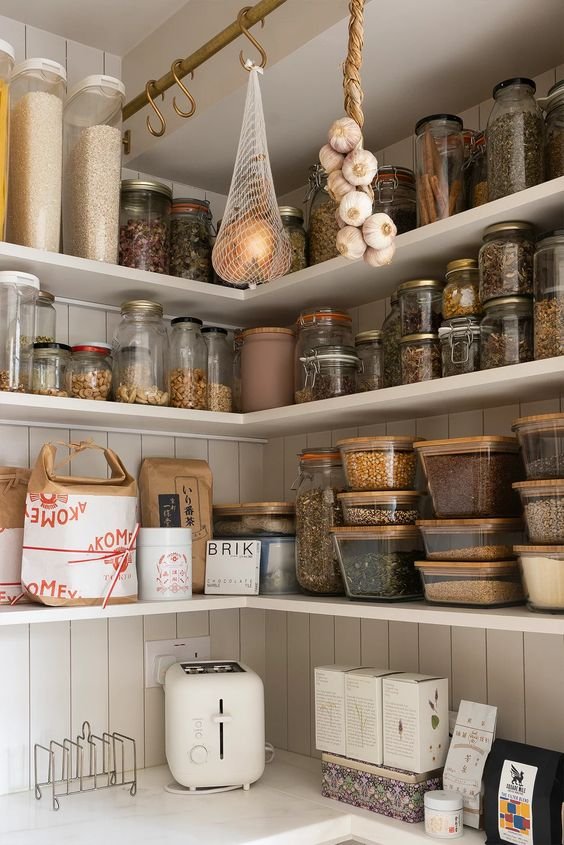Postpartum Pantry Essentials: An Ayurvedic Food Guide for New Mothers
Postpartum Pantry foods
Did you know that your diet/nourishment needs be a top priority when preparing for postpartum?
The early days of postpartum are a time of massive transition for the body and mind. So it requires a different approach to eating The postpartum period is not just about healing physically, but also about finding balance and rejuvenation within your body and mind.
In Ayurveda, the postpartum period is considered a time when the body's agni, or digestive fire, is low and needs to be carefully nurtured back to strength. The focus is on high quality, easily digestible, warm, oily and nourishing foods that support both the physical recovery of the mother and the healthy development of the baby, particularly if you are breastfeeding.
When I am prepping a new mother’s pantry these are the essential items I always have on hand.
Fats
Lubricate, Cleanse, Hormone Balance
Opt for:
Ghee (First choice), Olive Oil, Sesame Seed Oil, Coconut Oil
Use healthy fats more than you think during postpartum.In Ayurveda/Ayurvedic Postpartum care ghee (golden nectar) is revered for its ability to deeply nourish and lubricate the tissues. It’s considered sattvic, promoting positivity and clarity. Incorporating ghee into your postpartum diet helps in rejuvenating the body, ignite agni, it is a carrier of other nutrients and aids in digestion. Ghee also removes waste out of deep tissues into the channels for elimination! I use ghee in almost everything for new mamas from ghee soaked dates, porridges to nipple cream.
Carbs
To Rebuild
Opt for:
Basmati Rice, Amaranth, Quinoa, Tapioca,Couscous, Barley, Sprouted grains.
Use in mother’s porridge, dal recipes, quinoa cakes or bowls, spiced steel cut oats with ghee and kefir yoghurt. These grains are high in fiber, which can help with postpartum digestion and provide a gentle, sustained release of energy.
Proteins
To Repair and Support
Opt for:
Buttermilk drinks, Cottage Cheese, Chicken, Poached eggs, Nuts (Almond, Brazil Nuts and Seeds) Tahini (once lochia is lighter)
These are a good source of protein and are highly regarded in Ayurveda for their ease of digestibility when cooked until soft and prepared into a drink or a broth/soup.
Vegetables
Opt for:
Asparagus, Zucchini, Fennel, Spinach, Beet, Carrot, Fresh Fennel, Pumpkin, Okra, Artichoke, Squashes
Stock up on fresh, seasonal fruits and an array of vegetables. In Ayurveda, cooked vegetables are always preferred during postpartum as they are easier to digest. Stewed fruits, such as apples and pears, can be soothing and light on the stomach.
In Ayurveda it is recommended to eat fruits separate from other food and to begin the day with a small amount of cooked fruits. Vegetables are encouraged after a few weeks, when digestion is stronger.
Avoid: Cauliflower, Broccoli,Cabbage, Green peppers, Brussel sprouts
Nuts and Seeds
Opt for:
Almonds, cashews and walnuts, along with pumpkin and sunflower seeds, chia seeds provide essential fats and nutrients.
Soak nuts overnight to make them easier to digest. Almonds and cashews are essential for nut milk tonics.
Seasonings
Opt for:
Ginger, Cumin, Fennel, Coriander, Cinnamon, Nutmeg, Saffron,Black Pepper, Paprika, Oregano, Thyme, Ajwan, Pippali,Garlic (well cooked, never raw) and Turmeric.
Seasonings are essential in Ayurvedic Postpartum cooking for the ability to awaken the senses, breakdown hard to digest foods, stimulate digestion, reduce gas, support lactation and help with inflammation.
Herbal Teas
Opt for:
Fennel/Fenugreek (Sweetwater lactation tea), Tulsi, Nettle, Rose
Hydration and the movement of fluids in the body is key in postpartum and to a nursing mother. Herbal teas may boost your mood, make you feel a little more settled and rejuvenate.
Sip on herbal teas throughout the day add a squeeze of lemon or lime and a teaspoon of honey can be hydrating and supportive for digestion and relaxation.
Dates and Figs
These sweet fruits are packed with fiber, vitamins, and minerals, and in Ayurveda, they are known for building strength, support blood sugar balance and support the reproductive tissues.
Ayurvedic Herbs
Opt for:
Shatavari, Ashwagandha, Dashmula, Brahmi
Shatavari is considered the woman healer for postpartum, known to support lactation, balance hormones and overall women's health. Ashwagandha may help in dealing with stress, sleep, nervous system reset and fatigue. Brahmi is used for restoring the skin & ligaments, a deep nervous system reset, uplifts the mood. Dashmula calms the pelvic floor, rejuvenates, supports fluid balance, protects the immune system, reduces hot flashes.
However, it's important to consult with an Ayurvedic practitioner before incorporating these herbs into your routine.
Pantry Tips
As you prepare your postpartum pantry, it’s essential to plan ahead! Things take time to order and to shop for so organize your pantry weeks if not a few months ahead. Label glass, airtight storage jars, stock up on extra mason jars for soups, stews, dahls and porridges. Prepare almond herbal snacks, digestive chewing herbs, herbal teas and spice jars ahead.
Prepare the recipes needed for recovery:

